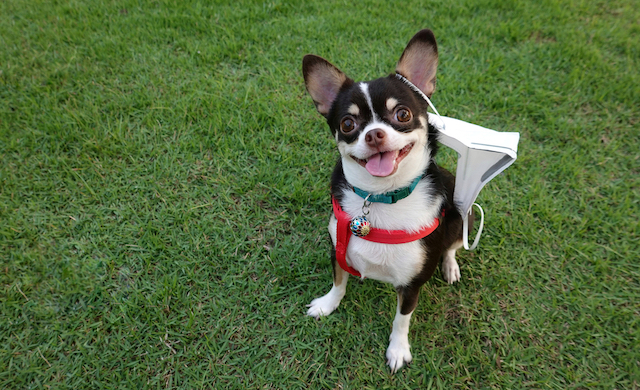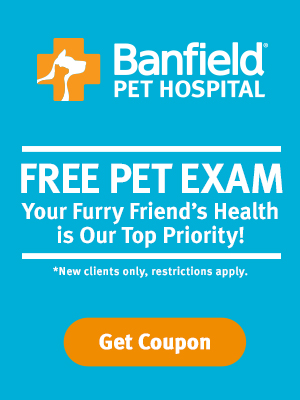
Coronavirus: Experts say dogs, cats are not affected
03/20/2020 06:00AM | 4009 viewsDuring the outbreak of coronavirus, people have wondered if pets could become sick or transfer the virus.
While it is believed the virus may have originated with birds or pigs, health officials say there is no evidence that dogs or cats are at any risk of getting sick from the virus, and there is no risk that they could spread Covid-19 to people. In a statement, Brian Weltge, the President & CEO of the Humane Society of Greater Dayton, says, “All health organizations and veterinary organizations confirmed that there is no threat of getting the virus from your dogs, cats or other pets. Although they do continue to monitor and evaluate this, at this point interaction with your pets is fine.”
The Humane Society of Greater Dayton has set up a website resource at www.hsdayton.org/coronavirus.
Here is the full text of the news release issued Friday from the Humane Society of Greater Dayton:
The Humane Society of Greater Dayton has been talking with Public Health officials and want to assure pet owners that currently, there is no evidence that pets can become sick from COVID-19. Infectious disease experts, as well as the CDC, OIE, and WHO indicate there is no evidence to suggest that pet dogs or cats can be a source of infection, including spreading COVID-19 to people.
“In a time of much uncertainty, we do not want pet owners to abandon animals in fear of getting the COVID-19 virus from them,” said Brian Weltge, President & CEO of the Humane Society of Greater Dayton. “All health organizations and veterinary organizations confirmed that there is no threat of getting the virus from your dogs, cats or other pets. Although they do continue to monitor and evaluate this, at this point interaction with your pets is fine.”
For more information on pets and the COVID-19 virus, visit www.hsdayton.org/coronavirus. We will continue to update this page and links as more information is provided to us.
The Ohio Department of Health Director Amy Acton, M.D., MPH strongly recommends taking the following actions:
For pet owners:
- Practice everyday preventive actions to stay healthy around your pets. At this point there is no evidence that companion animals, including pets, can spread COVID-19.
- Identify backup caretakers for pets in the event you are confirmed to have COVID-19.
- Wear a well-fitted mask and limit interaction with pets and other animals if you are confirmed to have COVID-19 and identified by public health officials as requiring home care and isolation. Service animals should be permitted to stay with their handlers.
- Implement practical measures to protect yourself, your family, or pets from this or any other contagious respiratory illness.
- While there is no vaccination against COVID-19, always vaccinate pets as recommended by your veterinarian to protect them from other diseases.
For veterinarians:
- Communicate about COVID-19 with your staff. Share information about what is currently known about COVID-19, the potential for surge, and your facility’s preparedness plans.
- Counsel clients on disease prevention practices, including how to stay safe and healthy around pets and other animals.
- Post visual alerts (signs, posters) at entrances and in strategic places providing instruction on hand hygiene, respiratory hygiene, and cough etiquette. Ensure prevention supplies are available (tissues, waste receptacles, alcohol-based hand sanitizer).
- Double the frequency of and enhance environmental cleanings using EPA-approved disinfectants.
- Monitor the availability or personal protective equipment (PPE) and implement Strategies for Optimizing the Supply of N95 Respirators.
Out of an abundance of caution, the American Veterinary Medical Association (AVMA) recommends you take the same common-sense approach when interacting with your pets or other animals in your home, including service animals. You should tell your physician and public health official that you have a pet or other animal in your home. Although there have not been reports of pets or other animals becoming sick with COVID-19, it is still recommended that people sick with COVID-19 limit contact with animals until more information is known about the virus. So, if you are ill with COVID-19, have another member of your household take care of walking, feeding, and playing with your pet. If you have a service animal or you must care for your pet, then wear a facemask; don’t share food, kiss, or hug them; and wash your hands before and after any contact with your pet or service animal. You should not share dishes, drinking glasses, cups, eating utensils, towels, or bedding with other people or pets in your home. While we are recommending these as good practices, it is important to remember there is currently no evidence that pets can spread COVID-19 to other animals, including people.
Other suggestions from the AVMA include:
- Because animals can spread other diseases to people and people can also spread diseases to animals, it’s a good idea to always wash your hands before and after interacting with animals.
- Identify another person in your household who is willing and able to care for your pet in your home should you contract COVID-19. Make sure you have an emergency kit prepared, with at least two weeks’ worth of your pet’s food and any needed medications. Usually we think about emergency kits like this in terms of what might be needed for an evacuation, but it’s also good to have one prepared in the case of quarantine or self-isolation when you cannot leave your home.
- If you are not ill with COVID-19 or another communicable disease (e.g., cold, u), call your veterinarian to make an appointment for your pet or service animal as you normally would.
- If you are sick with COVID-19 or another communicable disease, you should stay at home, minimizing contact with other people, until you are well. Accordingly, if this is a non-urgent appointment that needs to be scheduled for your pet or service animal (e.g., annual wellness examination, routine vaccination, elective surgery), you should wait to schedule that appointment until your physician and your public health social believe you no longer present a risk of transmitting your infection to other people you may encounter during such a visit, including owners of pets or other animals and veterinary clinic staff.
- If you are sick with COVID-19, and you believe your pet or service animal is ill, please seek assistance from your veterinarian and public health official to determine how to best ensure your pet or service animal can be appropriately cared for while minimizing risks of transmitting COVID-19 to other people.
- If a pet or service animal becomes ill after being around someone who is ill with
COVID-19, talk with the public health official working with the person who is ill with COVID-19. Public Health can then consult with a public health veterinarian who, in turn, can provide assistance to your veterinarian to ensure your pet or service animal is appropriately evaluated. - If the state public health veterinarian recommends that you take your pet or service animal to your veterinarian for an examination, please call your veterinarian in advance to let them know that you are bringing in a sick animal that has been exposed to someone with COVID-19. Advance notice will support the veterinary clinic/hospital in preparing for the proper admittance of that animal, including the preparation of an isolation area as needed. Do not take the animal to a veterinary clinic until you have consulted with the public health official and your veterinarian.
- Any animals imported into the United States will need to meet CDC and USDA requirements for entering the United States. At this time there is no evidence that animals other than the bat source of SARS-CoV-2 can spread COVID-19. As with any animal introduced into a new environment, recently imported animals should be observed daily for signs of illness. If an animal becomes ill, the animal should be examined by a veterinarian. Call your veterinarian before bringing the animal into the clinic and let them know that the animal was imported from an area identified as high-risk for COVID-19.











Post your Comment
Please login or sign up to comment
Comments